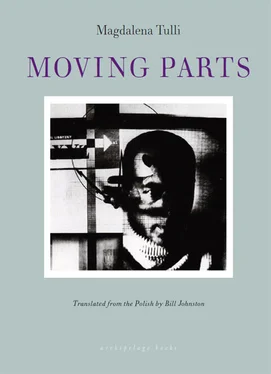Magdalena Tulli - Moving Parts
Здесь есть возможность читать онлайн «Magdalena Tulli - Moving Parts» весь текст электронной книги совершенно бесплатно (целиком полную версию без сокращений). В некоторых случаях можно слушать аудио, скачать через торрент в формате fb2 и присутствует краткое содержание. Год выпуска: 2005, Издательство: Archipelago Books, Жанр: Современная проза, на английском языке. Описание произведения, (предисловие) а так же отзывы посетителей доступны на портале библиотеки ЛибКат.
- Название:Moving Parts
- Автор:
- Издательство:Archipelago Books
- Жанр:
- Год:2005
- ISBN:нет данных
- Рейтинг книги:4 / 5. Голосов: 1
-
Избранное:Добавить в избранное
- Отзывы:
-
Ваша оценка:
- 80
- 1
- 2
- 3
- 4
- 5
Moving Parts: краткое содержание, описание и аннотация
Предлагаем к чтению аннотацию, описание, краткое содержание или предисловие (зависит от того, что написал сам автор книги «Moving Parts»). Если вы не нашли необходимую информацию о книге — напишите в комментариях, мы постараемся отыскать её.
Moving Parts — читать онлайн бесплатно полную книгу (весь текст) целиком
Ниже представлен текст книги, разбитый по страницам. Система сохранения места последней прочитанной страницы, позволяет с удобством читать онлайн бесплатно книгу «Moving Parts», без необходимости каждый раз заново искать на чём Вы остановились. Поставьте закладку, и сможете в любой момент перейти на страницу, на которой закончили чтение.
Интервал:
Закладка:
They are in no hurry; they sit with their elbows resting on the edge of the crumb-strewn table. The woman, in blue jeans, takes a cigarette from a packet lying on the table. The man gives her a light; his biceps bulge beneath his black sweater. They talk. What can they be talking about? She laughs, looking directly into his narrowed eyes; she tilts back her head with its short red hair, blows out a cloud of smoke and taps ash into the ashtray. If she wished to act like a woman sitting at a table in a hotel dining room with a man in a black sweater, there is nothing more she would have to do. While they remain at the table they look happy; a thoroughly secure future extends before them: in the morning coffee and rolls, in the evening somersaults over the abyss, and so on for all eternity. Is this enough to make them feel confined by the circus metaphor in which their fate is enclosed? And even if so, do they have any course of action other than to take up the life that has been assigned them in this tale? Perhaps it would be better for them to remain forever at the table set for breakfast, she with a cigarette, he with coffee cup in hand, and between them on the white tablecloth, let’s say, a green apple, which somehow neither of them feels like eating. They’d sit like this endlessly, sprawling on padded chairs whose softness comes from the pink stuffing hidden under the upholstery. It isn’t difficult to imagine what hardships, mortifications, and disappointments these two would be spared. But no one wishes to remain forever in an inconsequential moment. Thoughts flee from it in reverse gear toward accomplished facts, while desires, having nothing to look for in the past, rush forward at breakneck speed. Only the second hand of a watch thrashes about in the present tense, trembling nervously. All alone, over and again it passes by the two broader hands as they turn unhurriedly in their matching orbits, evidently connected with it only mechanically. The rhythm of its feverish twitching is foreign to them. To the body though it is only too familiar — the delicate body, warm with desires, which, surging toward the future, at that very moment collapses into the past, sinking helplessly into it, enmired. And while the moment called the present still continues, its existence is felt merely as an uncontrolled turmoil of heart and mind, a chaos from which one tries to flee as far as possible. And so the dining room will soon empty and the pair finishing their breakfast will eventually vacate their chairs, abandoning green apple peelings and the crumbs scattered over the tablecloth. Are those their cups, with a mouthful of coffee left at the bottom, traveling away on a nickel-plated cart? They merely passed through their hands, amid the clatter of silverware and the murmur of voices forming the daily loop between the dishwasher and the table. The man is seen again briefly in the lobby behind the glass pane, then the woman too; in the background there are large sofas, in whose insides pink stuffing covers the unpleasant steel spirals of invisible springs and gives the leather upholstery a rounded appearance. We’ll learn that as they were drinking their coffee, their suitcases, ready for departure, were waiting by the front desk, at the crossing of ways that lead to train stations and airports — where all worlds meet and where any character is expected only to complete certain uncomplicated formalities. The last of these will be to wish a toneless good day, which must be acknowledged a moment before the final parting in a damp and dark early morning in, let’s say, November. One’s gaze has to glide over a glass jar filled with candies that no one takes. With the bill in one’s wallet, one disappears in the twinkling of an eye, not leaving behind an empty space, nor a hint of longing, nor a breath of regret. The nature of suitcases is such that they are both there and not there at the same time; the gleaming floor already shines through their substance, and it will remain in its place once the cases have gone off in the trunks of taxicabs. On the other side of the mirror-smooth slabs of synthetic stone to which mud will not cling, let us imagine at least two floors of cellars, with plumbing, central heating pipes, a series of transformers and coils of cables. And still lower a bottomless chasm, the same one in which southern seas bristling with coral reefs mortally perilous for sailing ships, and roiling with waves of unassuaged emotions, extend all the way to the lifeless northern seas sheeted with permanent ice, their frozen waves covered with hoarfrost. In the antipodes of the present world of the hotel lobby where every object stands in its place, one can expect a realm dispossessed of all order in which top is bottom and down is up. The sofas, armchairs, and tables of that other world, deprived of solid ground, fall chaotically, directly into the void of that reversed sky, into oblivion. Tablecloths slip from tables and sail through the air, crumpling and folding; plates and silverware fly every which way; tea splashes from teapots. Everything comprehensible and obvious here, in that place must appear tortuous, indecipherable, absurd. But the flooring of synthetic stone conceals the dark gulf, persistently imposing itself on the eyes; one’s gaze slides involuntarily across the reflecting surface. The pair to whom so much attention has been paid has called not one but two cabs. Each of them will now depart in a different direction. The man in the black sweater slips the hotel receipt into his wallet; in his eyes is repeated the row of lamps shining coldly over the counter. The short, simple surname the receipt is made out to may begin with the letter M. And that is the last that’s seen of them. The tale is like a hotel; characters appear and disappear.
The narrator feels tired at the mere thought of the next sentence, though the story hasn’t even begun. It could be thought that all this time it has been spinning its wheels, emitting a hum thoroughly reminiscent of street sounds muffled by panes of glass. Its emptiness and sterility are written in the dull-colored plaster and the indifferent sky. One feels like ordering a beer and watching the foam settle in the mug, nothing more. If the narrator could choose, he’d prefer to tell about things free of complications, about leather-bound furniture exuding the cool tranquility of affluence and fortunate never to feel the weight it is its lot to carry; about glistening tiles of synthetic stone; about spotless panes of glass; about white porcelain cups in sets of six dozen — if one or two are broken it won’t be the end of the world. If the narrator really could chose, he would prefer not to tell about anything at all. Then where did this next character come from? How could he suddenly have come into view? He has arrived in a taxicab that drove around a square on which a bronze horse covered in green patina rears on its hind legs bearing a rider encased in armor. A few sparrows have taken wing from the raised visor. The newcomer has paid for his ride and is climbing out of the cab. From his pocket there juts a folded newspaper; it could, for example, be the Financial Times. This vignette is an agreed-upon signal intended especially for the narrator — a sign that forces itself on his gaze.
Let’s say that it is still raining. Let lights be reflected in the wet asphalt as if it were a mirror; let clouds pass across the puddles, and in the aquaria of the shop windows let umbrellas rise, weightless as jellyfish. The raindrops have already added a spotted design to the plain fabric of the man’s jacket. Let’s say that his overcoat was stolen at the airport. Did he also lose his wallet, tucked into an inside pocket? The wet sidewalk reflected the lights of the hotel, while the semitransparent image of the bronze rider shook slightly in the glass of the revolving door and spun on his horse as if on a merry-go-round when the new character entered the lobby. Across the mirrors drifted the aforementioned jacket, an immaculate white shirt collar and a necktie that is rather ironic, but also rather flashy — of course, within the limits of what’s permissible in places where the only salvation is to reconcile freedom with servitude. Narrators have a fondness for details; they pluck them skillfully and with relish out of the background. The necktie tells them almost everything, while the eyeglasses merely reflect the external world, little more than a fragment of a setting that narrators know like the back of their hand. Different profiles and faces are chosen for jackets than for black sweaters; foreheads can be smoother, gazes milder, and this principle, let it be noted, has been upheld. Despite this, it’s hard not to notice a striking resemblance between the two male figures, especially when the strip of lamps shining coldly over the front desk flashes in the newcomer’s glasses. The reservation is found under the name of a well-known shipping company whose shares have for some time been considered an excellent investment. Having the traveler’s expert knowledge at its disposal, the firm did not omit to arrange for a roof over his head, forbearingly, with resignation even, accepting the fact that he, too, has a body, as troublesome and demanding as any other. On the hurriedly completed form there briefly appeared a long and illegible name beginning with the letter F. The top-class specialist, whose involvement guarantees success for the company — by now it’s certain that it is him — reaches for his keys. The tan lines on his hand reveal that as recently as July or August he was wearing a wedding band. He could have taken it off a quarter of an hour ago even, slipping it into the same pocket from which the now unnecessary newspaper protrudes. But the smiling desk clerk doesn’t fall for such a trick — neither she nor anyone else. In the meantime the bell of the elevator rings out over the door with its steely gleam, described in the trimmings catalogs as a half-matte easy on the eye. The door opens and closes with a barely audible hiss, easy on the ear, and F. is already exiting on some floor or other; thick carpeting muffles his steps. He opens the room vacated by the other two, which by now has been cleaned so thoroughly that no trace of them is left. F. ought immediately to put in a call to his bank and give them the numbers of his lost credit cards. Instead, he rakes his fingers through his hair and goes up to the window. So it’s possible that his wallet remained safely in the inside pocket of his jacket, though even in this matter there can be no certainty, for there exist states of mind in the face of which the security of one’s bank accounts is of no importance. Mr. F. stares at the dull plasterwork and the gray sky that the narrator was reluctant to observe. He, too, has no wish to look at it; he draws the drapes carefully. He isn’t missing much. Walls and clouds were, in any case, blocking the view. There was no way to see beyond what was in plain sight. F. sits on the sofa, then lies down on it, like a passenger on a ship who has been overcome by the nauseating pitch of the vessel and has retired to his cabin. And thus a maritime metaphor encroaches on a foaming wave between the lines, thwarting the earlier circus metaphor that the narrator had only just finished dealing with. The new complication perplexes him. From the slipshod, woefully incomplete score with which he was provided, an equally important second subject is emerging. The rhythm is familiar — that of cautious steps over the abyss; in it one senses the quivering of ropes strung between the masts of a circus tent, or a sailing ship. This rather unexpected response to the first subject, which was presented in the passage containing the circus fanfares, is introduced, let’s say, by the French horn — does it not roar out in the voice of a ship’s foghorn? Either way, the second subject has now been imposed on the narrator without a trace of decency or sympathy, since in the parts of the score that are supposed to give a sense of the whole, gaps have been left. It isn’t clear whether the one who appointed the narrator left him without guidelines through an oversight, or whether perhaps he neglected the details, preoccupied with some other, more important task. Or he simply couldn’t be bothered, and so deliberately shirked the effort of finding harmonies. In place of a round island yellow with sawdust and washed by lofty waves of admiration and awe, from the heights of the crow’s nest there can be seen somewhere down below the deck of a sailing ship tossing on the ocean waves. The planks of the deck have the same yellow color of untreated wood; the clamorous undulations of the audience closely resemble the sound of high seas. In essence we are still dealing with the same thing: that which is visible. Then what is the essence of the invisible structure, its foundation and its core? Maybe the ropes strung across the abyss; maybe the ocean currents in the depths; maybe the precipitous lines of the graphs of market reports in the columns of the Financial Times. F. cannot know this either, since others who are better informed also do not know. No handbook can resolve the matter; no trade journal will figure it out. F.’s hand falls limply to the floor, as if he were asleep, when suddenly a sob issues from his throat. This sob will be heard a floor above by the maid when she turns off her vacuum cleaner for a moment. Is this really the room left by the other two? There’s no doubt about it; never mind the details. Whichever of the numerous rooms on many floors it might be, it would always be the same one. His other hand pulls the tie over his head, reaches for his collar and loosens it with a single tug, ripping the button off. In this scene the pop marks the turning point, which has just passed. From this moment all is preordained, with no return and no escape. It transpires that the well-paid professional with the ironic glint in his eyeglasses who was seen only a moment ago in the lobby and at the front desk — does not exist. The character lying tieless on a hotel sofa is not to blame for this. The fault lies with the troubles of life, with the dull plaster, the gray sky. It lies with hope or with the lack of hope — there’s no difference, since hope and lack of hope both lead to the same point.
Читать дальшеИнтервал:
Закладка:
Похожие книги на «Moving Parts»
Представляем Вашему вниманию похожие книги на «Moving Parts» списком для выбора. Мы отобрали схожую по названию и смыслу литературу в надежде предоставить читателям больше вариантов отыскать новые, интересные, ещё непрочитанные произведения.
Обсуждение, отзывы о книге «Moving Parts» и просто собственные мнения читателей. Оставьте ваши комментарии, напишите, что Вы думаете о произведении, его смысле или главных героях. Укажите что конкретно понравилось, а что нет, и почему Вы так считаете.












